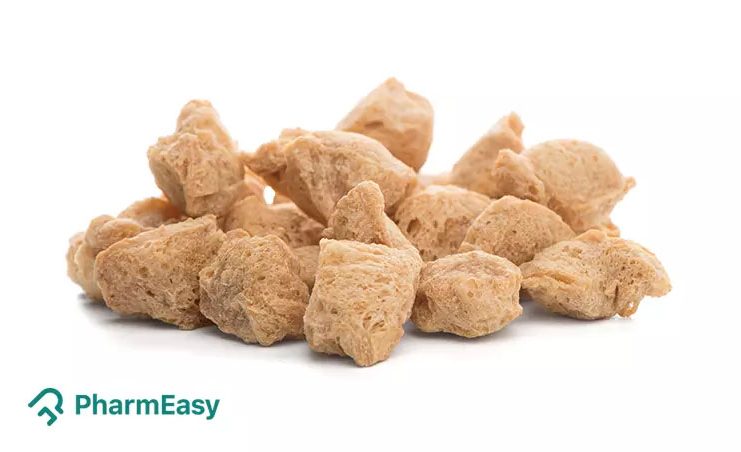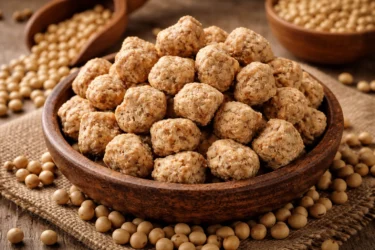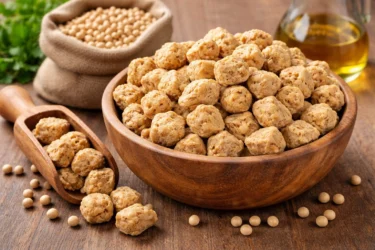Soya Chunks: Uses, Benefits, Side Effects By Dr. Smita Barode
By Dr Smita Barode +2 more

Get,

to manage your symptom
Get your,


4 Cr+ families
benefitted

OTP sent to 9988776655



You’ve successfully subscribed to receive
doctor-approved tips on
Whatsapp

Get ready to feel your best.

Hi There,
Download the PharmEasy App now!!


Register to Avail the Offer
Send OTPBy continuing, you agree with our Privacy Policy and Terms and Conditions

Hi There,
Sign up on PharmEasy now!!
Trusted by 4 crore+ families

OTP sent to 9988776655



You have unlocked 25% off on medicines




Code: NU25
By Dr Smita Barode +2 more
Table of Contents
In the last few years, the vegetarian diet has been gaining popularity as many people are looking for alternatives to non-vegetarian foods. The animal diet contains protein, which is an essential part of one’s diet and crucial for human growth. However, vegetarians can’t consume meat. Alternatively, plant-based protein, like soya chunks, is now being utilised to meet the protein demand. Soya chunks are derived from soya bean which is scientifically known as Glycine max, belonging to the pea family (Fabaceae). Soybeans, part of the legume species, contain proteins. Glycinin and β-conglycinin. Along with proteins, they also contain lipids, dietary fibres, and moisture1. Let us learn more about the benefits of eating soya chunks.

Soya chunks contain 335 kcal of energy per 100g. The other nutrients present in soya chunks per 100gm are2:
Soya chunks are derived from soya beans, and the following are the properties of soya chunks:
The potential soya chunks benefits are:

Soya chunks may have low saturated fat compared to animal-based proteins. It may also have low-density lipoprotein (bad cholesterol) and triglycerides in low quantities. This may prevent the risk related to cardiovascular diseases like diabetes and obesity5. Based on this, soya chunks may be used against cardiovascular diseases. If you have heart-related issues, contact your doctor and do not self-medicate.

Soya chunks may reduce cholesterol levels. It contains protein and isoflavones (genistein and daidzein)6. A randomised controlled study7 showed that regular consumption of protein may decrease cholesterol levels.The soya chunks are less in carbohydrates and rich in protein sources, which may help in decreasing cholesterol levels. If you have cholesterol-related issues, consult your doctor and do not self-medicate.

Soya chunks benefits for females in hot flashes are a symptom of menopause and can be due to decreased estrogen levels. Isoflavones present in soybeans have a chemical structure similar to estrogen. Regular intake of soya chunks containing isoflavones may potentially give the same result. Isoflavones bind weakly to estrogen receptors and may give estrogen-like activity. This helps because ovaries stop producing estrogen during menopause. Therefore, when isoflavones might give estrogen-like activity, they may help reduce the symptoms5. If you have any of these symptoms, consult your doctor and do not self-medicate.

Bone loss is another condition associated with menopause. Soya chunks are rich in proteins as well as isoflavones and calcium. It may prevent the risk of osteoporosis and may improve brain health. A study5 reviewed that soya protein consumption may influence bone mineral density. In addition, a reduction in bone resorption turnover rate may be observed in many randomised controlled trials. Another study8 showed that women who consumed soya protein isolate may have lower markers of bone turnover when compared to placebo.1 If you have any bone-related problems, consult your doctor and do not self-medicate.

Soya chunks may help in cancer elimination as they are rich in various nutrients. These nutrients may inhibit abnormal cell division and may serve as an anti-cancer inhibitor in various forms of cancer. The presence of genistein, an isoflavone, may block cancer tumours and may provide nourishment for proper growth9. If you have any cancer-related problems, consult your doctor and do not self-medicate.

Soya chunks are rich in protein and have fewer carbohydrates. The regular consumption of soya chunks may help in weight loss5. Soya protein may control hyperglycemia and hyperlipidemia, which indirectly may help in reducing weight. If you are obese and want to lose weight, consult your doctor. Do not self-medicate.

Another health benefit of soya chunks is that vegetarians and vegans who do not consume meat-based products can potentially get their source of daily protein from them. Soya chunks are rich in protein and are plant-based.
For instance, soya chunks are a good source of arginine and glycine, which are crucial nutrients in the urea cycle and collagen synthesis5.
Though there are studies that show the benefits of soya chunks in various conditions, these are insufficient and there is a need for further studies to establish the true extent of the benefits of soya chunks on human health.
Also Read: Brahmi: Uses, Benefits, Side Effects, and more!
You can incorporate soya chunks into your meals regularly. Soya chunks have to be boiled and then can be incorporated into many dishes. A few ways to do this are:
You must consult a qualified doctor before taking soya chunks or any herbal supplements. Do not discontinue or replace an ongoing treatment of modern medicine with an ayurvedic/herbal preparation without consulting a qualified doctor.
Also Read: Paneer: Uses, Benefits, Side Effects By Dr. Smita Barode
Anything consumed in excess can have a side effect. Eating soya chunks daily can have disadvantages. The most common side effects of consuming soya chunks are:
Also Read: Sabudana (Sago Pearls): Uses, Benefits, Side Effects & More!
Soya proteins are largely beneficial to humans; however, consumption over the recommended amount can cause adverse reactions like nephrotoxicity, hepatotoxicity, and allergic reactions. In a review, it was observed that soya proteins may have effects on endocrine glands, toxic effects on the kidney and liver, and may have carcinogenic effects on the pancreas, breast, and thyroid gland. Therefore, it is necessary to be very cautious while taking soya chunks in large quantities.
Also Read: Multani Mitti: Uses, Benefits, Side Effects & More!
Interaction with other medicines or compounds is rare but can occur. Thyroid hormone, iron, monoamine oxidase inhibitors, and warfarin can cause interaction.
Soya chunks are hypothesised to treat menopause symptoms like hot flashes because of their isoflavones, which have a similar structure to oestrogen. These may bind to oestrogen receptors and may reduce the symptoms
Soya chunks can be consumed by first boiling them and then incorporating them into several dishes like gravy, soup, and rice.
The potential benefits of consuming soya chunks are reduced risk of heart disease, reduced cholesterol levels, fighting against menopause, and managing weight. Another benefit of soya chunks is that they can be used as an alternative to animal-based protein products. If you have any mentioned symptoms or diseases, consult your doctor and do not self-medicate.
Disclaimer: The information provided here is for educational/awareness purposes only and is not intended to be a substitute for medical treatment by a healthcare professional and should not be relied upon to diagnose or treat any medical condition. The reader should consult a registered medical practitioner to determine the appropriateness of the information and before consuming any medication. PharmEasy does not provide any guarantee or warranty (express or implied) regarding the accuracy, adequacy, completeness, legality, reliability or usefulness of the information; and disclaims any liability arising thereof.
Comments

Leave your comment...
You may also like
Comments